- Home
- Beverly Cleary
Henry and Beezus Page 3
Henry and Beezus Read online
Page 3
“I get to keep it then, don’t I, Dad?”
Mr. Huggins smiled. “The police say there’s no reason why you shouldn’t keep it.”
“I was afraid of that,” sighed Mrs. Huggins. “Henry, how do you get mixed up in these things?”
“Boy, oh, boy!” Henry gloated. “Wait till I tell the kids at school!”
The next morning Mrs. Huggins didn’t have to tell Henry to hurry. He and Ribsy left for school fifteen minutes early. On the way Henry chewed a couple of balls out of the box he was carrying, so he could show off some really good bubbles.
As soon as he reached Glenwood School, boys and girls began to crowd around him. “Did you get to keep all that gum Mary Jane said you found in the lot?” they asked.
“Sure I got to keep it,” said Henry, disappointed at having his surprise spoiled. If that wasn’t just like a girl, especially Mary Jane. “I’m going to sell it two for a penny.”
The boys and girls knew a bargain when they saw one. “I’ll take four,” said Joey.
“Give me two,” said Peter.
Some of the children did not have money with them, but Henry said they could bring it the next day. He opened charge accounts by writing their names and the amounts they owed on the margin of a comic book he had in the hip pocket of his jeans. By the time the second bell rang, Henry had twenty-two cents coming to him. Boy, oh, boy, he thought. This is even better than I expected.
By noon the news of Henry’s treasure had spread throughout the school, and boys and girls from other rooms crowded around to buy the bargain gum. Henry was so busy selling that Beezus offered to write down the names of those who were going to bring their money the next day. By the time school was out, Henry had fifty-one cents in real money and forty-three cents written in his comic book. That was almost a dollar for his bike fund. Besides that, he had four marbles, a yo-yo, and six comic books.
And that was not all. Joey chose him to be the next blackboard monitor, Kathleen said she was going to invite him to her birthday party, six boys wanted to sit beside him in the cafeteria at noon, and Roger rode him home on his bicycle.
The next day Henry left even earlier and took another box of gum to school. He found business more complicated, because he not only had to sell gum and write down the names of the boys and girls who would bring their money the next day, he had to cross off in his comic book the names of those who had remembered to bring the pennies they owed him. He was glad when Beezus arrived and helped him keep the transactions straight.
At first, the boys and girls who were chewing Henry’s gum were careful to chew only when Miss Bonner wasn’t looking, but after a while they forgot to be careful. Then she said unexpectedly, “Henry, tell the class what mark of punctuation should go at the end of the sentence I have written on the blackboard.”
Taken by surprise, Henry quickly shifted his quid of gum to his cheek. “A period…uh…I mean a question mark,” he said.
“I think, Henry,” said Miss Bonner, “that if you throw your gum in the wastebasket, we shall all have much less trouble understanding you.”
Feeling foolish, Henry walked to the front of the room and threw his wad of gum into the empty metal wastebasket. When it landed with a loud clonk, the whole class tittered.
“And now,” said Miss Bonner, “I want everyone in the room who has gum in his or her mouth to throw it into the wastebasket.”
Sheepishly, half a dozen boys and Beezuswalked to the wastebasket and discarded their gum.
Miss Bonner looked around the room. “Robert,” she said sternly. “George.” The two boys slouched to the wastebasket.
After recess Miss Bonner marched another procession of gum chewers to the wastebasket. Although she didn’t say much, Henry decided she looked pretty cross.
When Henry carried his gum out to the playground at noon, he found to his surprise that no one wanted to buy. Nearly everyone was already chewing and blowing.
“Maybe if you cut the price you could sell more,” suggested Beezus.
“I guess I’ll have to,” said Henry. “I’ll try four for a penny.”
Business picked up after that, but when Henry went home after school, he wasn’t sure how much money he had. He actually had thirty-one cents in his pocket, but when he tried to figure out the accounts in the comic book, he had to give up. Some of the boys who had forgotten to bring their money had charged more gum. Some had paid, but he had forgotten to cross off their names. Anyway, the comic book was getting so ragged and dirty, and the pencil marks so smudged, that it was impossible to read anything. Tossing the book into the fireplace, Henry decided he could remember how much Roger and Peter and a few more owed. He would just have to hope the others paid him.
The next morning when Henry was about to start to school with a box of gum, Beezus rang the doorbell. She handed Henry her box of bubble gum. “Mother says I have to give this back to you,” she said.
“What for?” asked Henry.
“Because of Ramona. She gets into the gum and chews it and gets it stuck in her hair. The only way Mother can get it out is to cut it out with the scissors. Ramona looks pretty awful with her hair all different lengths, and Daddy says if this keeps up she’ll be bald before long.” Beezus looked apologetic. “Anyway, I’m kind of tired of chewing gum.”
When they reached the playground, Henry found business slow; everyone was already chewing gum. But when Henry cut the price to ten balls for a penny, he made several sales.
“Do you have any flavors beside cinnamon-peppermint or whatever it is?” asked Joey.
Henry had to admit he did not.
“Oh,” said Joey, and went away.
Henry tried to think what stores did when they wanted to sell something. He knew they had sales, they advertised, and they gave away free samples. Henry had tried gum sales and he couldn’t think of a good way to advertise, so he decided to try free samples. Although a dozen children crowded around him for samples, the demand was not as large as he had expected.
Then Roger, who owed Henry four cents for gum, approached him and asked for a free sample. Henry wasn’t sure whether he should give gum to someone who owed him money, but since he had given it to the others, he gave Roger a piece. Roger put it in his pocket.
“How about that four cents you owe me for eight balls of gum you bought yesterday?” asked Henry.
“I forgot it,” said Roger. “And anyway, how come you’re giving gum away today when you sold it yesterday?”
“Well…” Henry didn’t like to admit that no one was interested in his gum.
“Yes,” said Peter, joining in the conversation. “I don’t see why I have to pay you. You’re giving it away now.”
“I wasn’t giving it away yesterday and the day before,” said Henry. “I was selling it, so you owe me money.”
“I do not.” Peter blew a bubble that popped.
“You do, too,” said Henry, feeling confused.
The bell rang, and they started toward their classroom. Henry noticed Peter and Roger talking to each other. Then they gathered a bunch of children around them outside the door. They talked earnestly together until Miss Bonner herded them into the room.
Now what are they up to? thought Henry. He worried about it all through social studies and arithmetic. Somehow, things didn’t seem to be turning out the way he had planned. He was secretly pleased when Miss Bonner made Peter throw his gum in the wastebasket.
When recess came, Henry was surprised at the number of boys and girls who suddenly wanted free gum. He had almost as big a crowd around him as he had had on the first morning. He began to enjoy himself again.
Then Roger and Peter called to him. “Hey, Henry, can we see you a sec?”
“Sure,” said Henry, stepping away from the others.
“Here’s the gum I owe you.” Roger handed Henry eight balls of bubble gum.
“Mine, too.” Peter held out four balls.
“Hey, now wait a minute,” protested Henry. “That’s
not fair.”
“It is, too,” said Roger. “We bought gum from you and now we’re returning it instead of paying for it.”
“But you chewed it,” objected Henry. “I saw you, and Miss Bonner made you throw it in the wastebasket.”
“This gum hasn’t been chewed, has it?” asked Peter.
Henry had to admit it hadn’t.
“Then why can’t we return it, like in a department store?” demanded Roger.
Baffled, Henry took the gum. Something was wrong some place, but he couldn’t figure out what. He did know one thing, that was sure. There went six cents out of his bike fund.
Then Mary Jane ran up to Roger and Peter. “Did he take the free samples we collected for you?” she asked.
“Well, how do you like that!” exclaimed Henry. “That’s cheating, that’s what it is.”
“It is not,” said Mary Jane. “You gave us the gum and if we want to give it to someone else, that’s our business.”
Henry looked glum. He supposed it was her business. Mary Jane was one of those annoying girls who were always right. The worst of it was, now he couldn’t expect the others to pay. Henry was actually glad when the bell ended recess, even though he knew spelling came next.
That day no one chose Henry to be a monitor, and only Robert sat with him in the cafeteria. He heard Kathleen say she thought she wouldn’t invite any boys to her birthday party.
After lunch, when the class was settled with its readers, the room door opened and Miss Mullen, the principal, entered. She whispered to Miss Bonner and then turned to the class. “Boys and girls,” she announced, “I want to talk to you for a few minutes this afternoon. We have a problem at Glenwood School that we all should discuss.”
Now what? thought Henry. Probably running in the halls again or writing on the building with chalk.
Miss Mullen looked around the room. Then she said, “That problem is gum.”
Henry felt his neck and ears grow hot. He was sure everyone in the room was looking at him.
Miss Mullen continued. “There has been more gum chewing than usual at Glenwood School in the last few days. I wonder if someone can tell me why it is not a good idea to chew gum in school.”
The class was silent.
“Can’t someone give me a reason?” she asked. “Henry Huggins, why do you think it is not a good idea to chew gum in school?”
Henry’s ears felt as if they were on fire. He hadn’t known Miss Mullen even knew his name. “Uh…” he said. Why couldn’t he think of something to say? “Well…” He had to think of something. “It…uh…well…uh…I guess it is…lots of trouble for teachers to make kids throw it in the wastebasket.” The words came out in a rush. At least, he had said something.
“That is an excellent reason,” said Miss Mullen. “Chewing gum wastes valuable time. Who else can give me a reason?”
One of the girls timidly raised her hand and said, “Sometimes it gets stuck on the floor and things.”
“Splendid,” said Miss Mullen. “I was hoping someone would mention that, because our janitor tells me he has spent most of his time in the last few days scraping gum off the floors and desks.”
The class began to feel less shy and was suddenly full of reasons why gum should not be chewed in school.
Then Mary Jane raised her hand and said, “Miss Mullen, I know where the gum is coming from.”
Leave it to old tattletale Mary Jane, thought Henry. And after I showed her how to blow bubbles, too.
Miss Mullen said, “That isn’t important, Mary Jane. What is most important is that so many boys and girls have been chewing gum in school.”
What a relief! At least, Miss Mullen wasn’t going to point him out in front of everyone.
Miss Mullen smiled at the class. “Now that we have talked about our problem, I wonder how many boys and girls have decided not to chew gum in school anymore.”
Thirty-five hands shot into the air. “Splendid,” exclaimed the principal. “I knew I could count on Miss Bonner’s room to cooperate.”
When Miss Mullen left, Roger whispered across the aisle to Henry, “Now see what you’ve done.”
“Aw, keep quiet,” answered Henry out of the corner of his mouth, as he bent over his reader. He knew one thing. Even though the class forgot its promise in a few days, he wouldn’t be able to sell any gum around Glenwood for a long time.
After school he wasted no time in finding Mary Jane. “Tattletale!” he yelled.
“Pooh to you,” answered Mary Jane, with her nose in the air. “Everybody’s tired of your old gum anyway. It’s all that funny cinnamon-peppermint flavor.”
“Come on, Ribsy,” said Henry to his dog, who had been waiting under the fir tree. He popped a ball of gum into his mouth, chewed, and blew a halfhearted bubble that broke with a little spip. He spat out the gum. Somehow, he didn’t enjoy cinnamon-peppermint flavor anymore.
When Henry reached home, he threw his jacket and Daniel Boone cap onto a chair and went straight to the refrigerator. “Hi, Mom!” he said to Mrs. Huggins, who was frosting a chocolate cake. “That sure looks good.”
“You may lick the bowl when I’m finished.” Mrs. Huggins swirled the icing in a pattern on the cake. “And by the way, I want to talk to you.”
With a swipe of his finger, Henry wiped a drop of frosting from the edge of the bowl. It was peppermint-flavored.
“Henry, your hands aren’t very clean,” said his mother. “It’s about those boxes of gum you have under your bed. How do you expect me to run the vacuum cleaner in your room? Why don’t you give the gum to your friends? I’m sure they’d be glad to have it.”
Henry sighed. That was all his mother knew about his friends. Suddenly he found it made his jaws tired just to think about all those boxes and boxes of gum. He didn’t want to think about it. Gum—ugh!
“OK, Mom,” he agreed. “I’ll get rid of it. And don’t bother saving the bowl for me to lick.”
Henry and Ribsy went out onto the front porch. As Henry was wondering how he would get rid of the gum, Scooter rode by and called out, “Miss Mullen was sure on the warpath because of your old gum. She went to every room in the school. I bet you caught it.”
“I did not,” said Henry. “And anyway, what do I care?” That’s right, he thought, what do I care?
He had saved over a dollar for his bike fund, even if he couldn’t expect to collect from the rest of the people who owed him money. Not only had he earned some bike money, he had been famous for a few days, too. And for once in his life he had chewed all the gum he wanted. So had his friends. More than they wanted.
It did not take Henry long to make up his mind. “Come on, Ribsy,” he said, and ran down the street to Beezus’s house.
When Beezus and her little sister came to the door, Henry stared at Ramona. “Jeepers!” he exclaimed. “What happened to her?” Almost all the hair was cut off the left side of her head. The right side was jagged.
“Doesn’t she look awful?” asked Beezus. “After Mother cut the gum out of her hair, she got hold of the scissors and cut it herself. She says she wants to be bald like our Uncle Jack.”
Henry groaned. Now probably everyone would say this was his fault. It certainly was funny the way he kept getting into trouble just because of a bunch of old gum. He would be glad when he saw the last of it. “Say, Beezus,” he said, “could I borrow your red wagon again? I’m going to take that gum back to the lot and dump it where I found it.”
“Sure, you can borrow it,” answered Beezus. “Come on. I’ll help.”
3
The Untraining of Ribsy
One Saturday afternoon Henry was sitting on the front steps amusing Ribsy by throwing a stick for him to retrieve. Every time Henry tossed the stick out onto the lawn, Ribsy bounded after it, brought it back, and dropped it at Henry’s feet. Then Ribsy wagged his tail and waited for Henry to throw the stick again. Henry decided that since his dog was so smart about fetching sticks, he would teach him to bring his
father’s slippers or something useful.
While Henry and Ribsy were playing, Scooter McCarthy rode up on his bicycle and tossed the Huggins’ copy of the Journal onto the grass. “Say, Huggins,” he said, “I’m going to Scout Camp during Easter vacation next week and I wondered if you knew anybody I could get to take my paper route while I’m gone.”
Henry tossed the stick for Ribsy again. “I’ll take it, Scooter. I’ve always wanted to deliver papers.”
Scooter looked doubtful. “Aw, you’re not old enough.”
Henry knew that Journal carriers had to be eleven years old, but he said, “It wouldn’t matter for three days, would it? It would still be your route and I’d just be a substitute. Aw, come on, Scoot. Let me do it.”
“You don’t have a bike,” said Scooter, “and I could only pay a dollar.”
“I could walk,” said Henry. “And it’s all right about the dollar, too.” He wouldn’t admit it to Scooter, but he thought a dollar would be a lot of money to add to his bike fund all at once. “Please, Scooter. I won’t make any mistakes or anything.”
“I’ve got some pretty cross customers on my route,” warned Scooter. “That old Mrs. Jones phones the Journal office if just one teeny corner of her paper gets in the mud, and Mrs. Green gets mad if I throw the paper in her flower boxes. You’ve got to be careful when you deliver papers.”
“I could do it,” said Henry. “I’d be real careful. Honest, I would.”
“We-l-ll.” Scooter thought a minute. “All right. You can take the route, but you better not get me in trouble. I’ll give you a list of customers next week.”
“Gee, thanks, Scooter,” said Henry gratefully.
Jeepers, another dollar for his bike fund! Henry made up his mind he’d do such a good job delivering papers that Scooter would want him to take the route when he went away during summer vacation. Then he would really make some money for the fund. He could see himself walking down Klickitat Street throwing papers onto porches with an experienced flip of his wrist. Still better, he pictured himself riding down the street on a shiny red bike with his snap-on raccoon tail floating from the handle bars. Boy, oh boy, he was getting closer to that bike all the time.

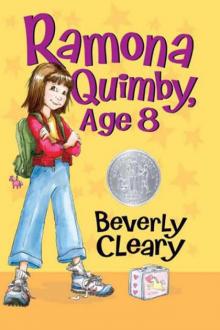 Ramona Quimby, Age 8
Ramona Quimby, Age 8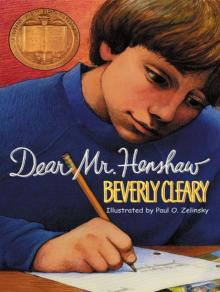 Dear Mr. Henshaw
Dear Mr. Henshaw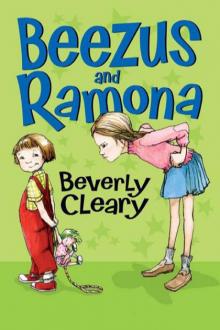 Beezus and Ramona
Beezus and Ramona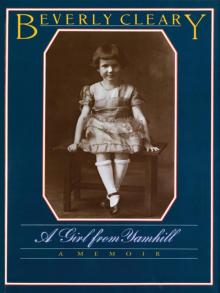 A Girl from Yamhill
A Girl from Yamhill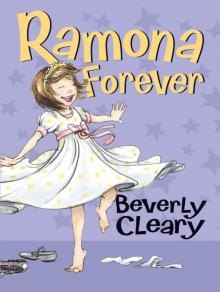 Ramona Forever
Ramona Forever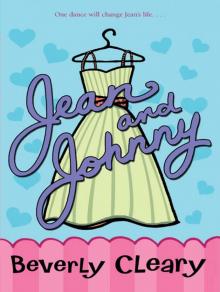 Jean and Johnny
Jean and Johnny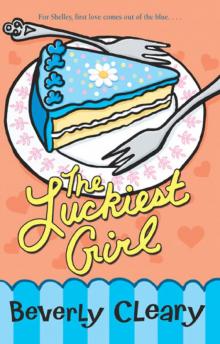 The Luckiest Girl
The Luckiest Girl Emily's Runaway Imagination
Emily's Runaway Imagination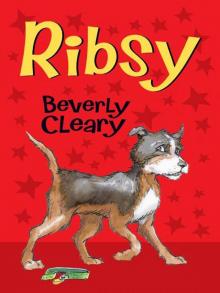 Ribsy
Ribsy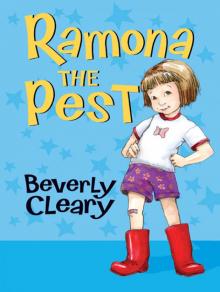 Ramona the Pest
Ramona the Pest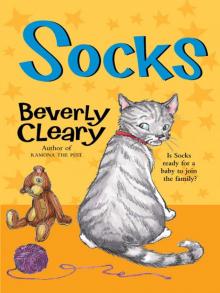 Socks
Socks Ramona's World
Ramona's World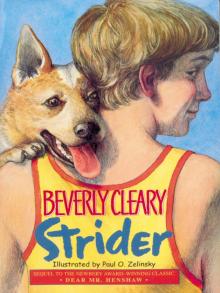 Strider
Strider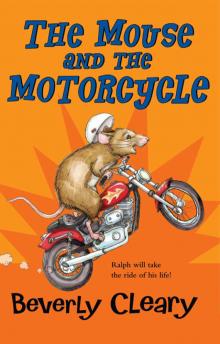 The Mouse and the Motorcycle
The Mouse and the Motorcycle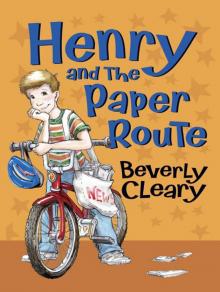 Henry and the Paper Route
Henry and the Paper Route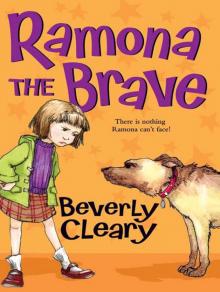 Ramona the Brave
Ramona the Brave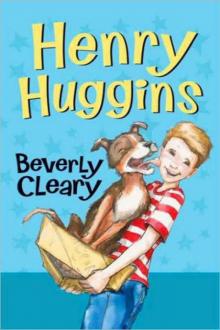 Henry Huggins
Henry Huggins Ramona and Her Mother
Ramona and Her Mother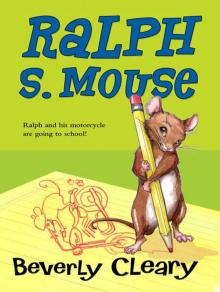 Ralph S. Mouse
Ralph S. Mouse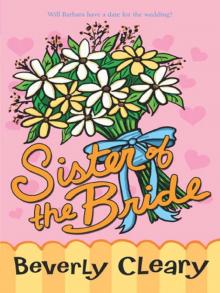 Sister of the Bride
Sister of the Bride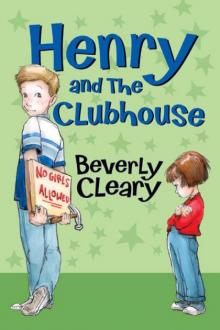 Henry and the Clubhouse
Henry and the Clubhouse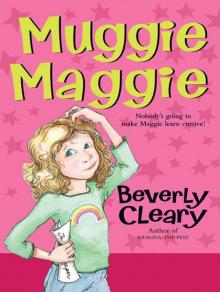 Muggie Maggie
Muggie Maggie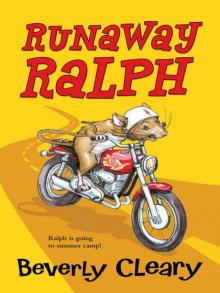 Runaway Ralph
Runaway Ralph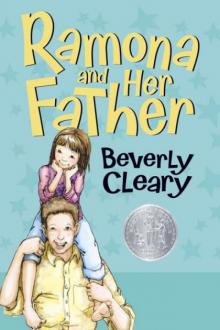 Ramona and Her Father
Ramona and Her Father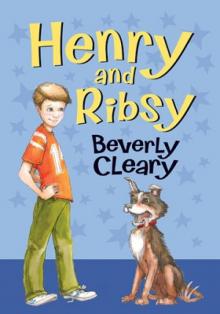 Henry and Ribsy
Henry and Ribsy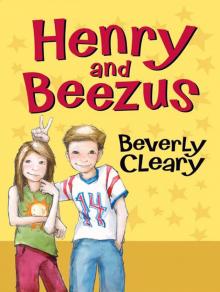 Henry and Beezus
Henry and Beezus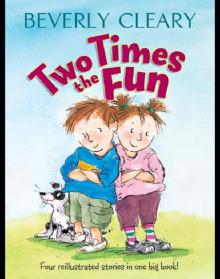 Two Times the Fun
Two Times the Fun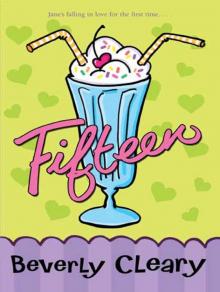 Fifteen
Fifteen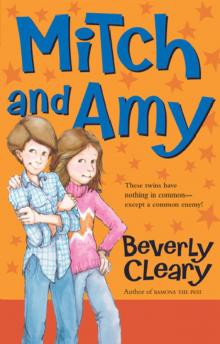 Mitch and Amy
Mitch and Amy